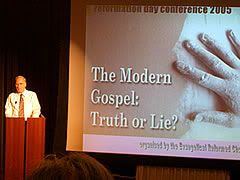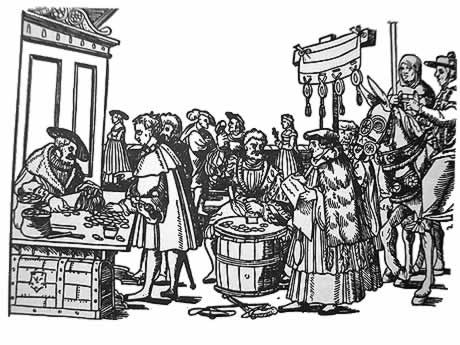(This is a slightly edited response to a comment that I
wrote at Tomorrow.sg)
The Bible clearly states that we are saved by grace alone, not by our works (Ephesians 2:8-9). The question is, after the Holy Spirit regenerated our hearts, will we still sin? Of course we will. We will still struggle with sin in our lives. However, the Holy Spirit will continue to work within us, transforming us to be more like Christ (Titus 3:5).
It is written in the Word of God that "it is easier for heaven and earth to disappear than for the least stroke of a pen to drop out of the Law." (Luke 16:17) Unless the New Testament explicitly states that homosexuality is no longer a sin, we should still follow the definition of sin as written in the Old Testament. The reason why we do not follow the Levitical dietary laws is because in the New Testament, God declared all food "clean" (Acts 10:15).
Take for instance, Leviticus 18:23, "Do not have sexual relations with an animal and defile yourself with it." If the Levitical laws are abolished, does it mean that bestiality is okay now? Or how about Leviticus 19:14, " Do not curse the deaf or put a stumbling block in front of the blind, but fear your God. I am the LORD." Would making fun of the disabled be permissible too?
One must be careful in understanding the substitutionary atonement performed at the cross. Jesus Christ came to die for the elect. For it is written, "I lay down my life for the sheep." (John 10:15) Jesus came to pay the penalty for the sins of the elect, not to remove the definition of sin itself.
Compare Christ’s atonement with the Levitical atonement that is performed every year in Leviticus 16. The Levitical atonement offering does not remove the definition of sin, but rather atone for the sins of the Israelites. In the same way, Jesus Christ’s death on the cross atones for the sins of the elect. The substitutionary atonement of Jesus Christ replaces the priestly offerings of the Old Testament (Hebrews 10:11-14).
Let’s look at the character of the Apostle Paul. He described his former self as “circumcised on the eighth day, of the people of Israel, of the tribe of Benjamin, a Hebrew of Hebrews; in regard to the law, a Pharisee; as for zeal, persecuting the church; as for legalistic righteousness, faultless.” (Philippians 3:5-6)
As a former Pharisee, the Apostle Paul would have possess an excellent understanding of the Levitical laws. By comparing 1 Corinthians 6:9-10 with the book of Leviticus and the book of Deuteronomy, I could not help but notice the following:
“Do you not know that the wicked will not inherit the kingdom of God? Do not be deceived: Neither the sexually immoral nor idolaters nor adulterers nor male prostitutes nor homosexual offenders nor thieves nor the greedy nor drunkards nor slanderers nor swindlers will inherit the kingdom of God.” (1 Corinthians 6:9-10 NIV)
- Sexually immoral (pornos)
“Do not degrade your daughter by making her a prostitute, or the land will turn to prostitution and be filled with wickedness.” (Leviticus 19:29)
- Idolaters (eidololatres)
“Do not turn to idols or make gods of cast metal for yourselves. I am the LORD your God.” (Leviticus 19:4)
- Adulterers (moichos)
“Do not have sexual relations with your neighbor's wife and defile yourself with her.” (Leviticus 18:20)
- Male prostitutes (malakos)
“No Israelite man or woman is to become a shrine prostitute. You must not bring the earnings of a female prostitute or of a male prostitute into the house of the LORD your God to pay any vow, because the LORD your God detests them both.” (Deuteronomy 23:17-18)
- Homosexual offenders (arsenokoites)
“Do not lie with a man as one lies with a woman; that is detestable.” (Leviticus 18:22)
- Thieves (kleptes)
“Do not steal. Do not lie. Do not deceive one another.” (Leviticus 19:11)
- Greedy (pleonektes)
“You shall not covet your neighbor's wife. You shall not set your desire on your neighbor's house or land, his manservant or maidservant, his ox or donkey, or anything that belongs to your neighbor.” (Deuteronomy 5:21)
- Drunkards (methusos)
“They shall say to the elders, "This son of ours is stubborn and rebellious. He will not obey us. He is a profligate and a drunkard." Then all the men of his town shall stone him to death. You must purge the evil from among you. All Israel will hear of it and be afraid.” (Deuternomy 21:20-21)
- Slanderers (loidoros)
“Do not go about spreading slander among your people. Do not do anything that endangers your neighbor's life. I am the LORD.” (Leviticus 19:16)
- Swindlers (harpax)
“Do not use dishonest standards when measuring length, weight or quantity. Use honest scales and honest weights, an honest ephah and an honest hin. I am the LORD your God, who brought you out of Egypt.” (Leviticus 19:36-37)
Now, every single one of the sins mentioned by the Apostle Paul is found in the Old Testament. The argument given by those in the pro-homosexual camp is that the Greek word
arsenokoites is obscure and uncertain, and could refer to a male prostitute.
According to the
Thayer's Greek-English Lexicon, the Greek word
malakos could be defined as “a catamite, a boy kept for homosexual relations with a man, a male who submits his body to unnatural lewdness, or a male prostitute.” If the Apostle Paul used
malakos to mean a male prostitute, then it would be illogical to use another Greek word to refer to a male prostitute. Therefore, the Greek word
arsenokoites should be referring to something else.
Exploring deeper into the Greek word
arsenokoites, the
Thayer's Greek-English Lexicon shows us that the word is made up of two Greek words, which are
arrhen / arsen and
koite.
- arrhen / arsen – a male.
- koite - a place for laying down, resting, sleeping in (a bed, couch), the marriage bed (of adultery), cohabitation, whether lawful or unlawful (sexual intercourse)
Since the Apostle Paul gave a broad sweeping description of most of the Old Testament sins, which includes sexual sins like sexual immorality, adultery and prostitution, it does make sense to render the Greek word
arsenokoites as homosexual offenders to be consistent with the rest of 1 Corinthians 6:9-10.

 I was attending the
I was attending the 






